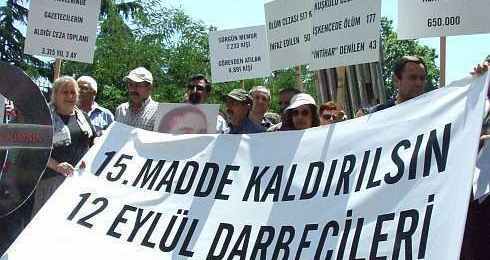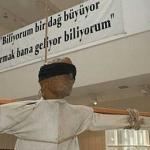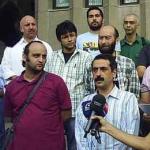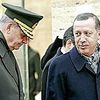Following the call of the 78'ers Initiative, a press statement calling for the abolishment of Provisional Article 15 in the Constitution has been signed by around 30 NGOs, parties and associations.
The statement was read out in front of Galatasaray Highschool in central Istanbul at the weekend.
Referring to the renewed debate on the military coup of 12 September 1980, the statement said:
"Whatever the aim of the Republican People's Party (CHP), the climate created today is important. Because crimes against humanity do not recognise a statute of limitations, coup leaders guarantee their own safety with such articles when there is a move from a junta regime to a democracy. It is not enough for them to have immunity while they are in power, they also want immunity afterwards."
According to the Provisional Article 15, the coup leaders and those governing the country afterwards are protected from prosecution.
Content of the article
The article reads:
"No allegation of criminal, financial or legal responsibility shall be made, nor shall an application be filed with a court for this purpose in respect of any decisions or measures whatsoever taken by: the Council of National Security formed under Act No. 2356 which will have exercised legislative and executive power on behalf of the Turkish Nation from 12 September 1980 to the date of the formation of the Bureau of the Turkish Grand National Assembly which is to convene following the first general elections; the governments formed during the term of office of the Council, or the Consultative Assembly which has exercised its functions under Act No. 2485 on the Constituent Assembly.
Soldiers to be tried in civilian courts
Related to this issue, on Thursday, 25 April, the ruling Justice and Development Party (AKP) presented a bill in parliament suggesting that soldiers be tried in civilian courts in peace time. Currently, the military and civilian courts often run in a parallel manner, leading to a two-headed judiciary.
Şanar Yurdatapan, a human rights activist who was taken to military court in 2000 for expressing support for conscientious objection against military service, and convicted, has expressed pleasure at the move, but finds it insufficient:
"I dislike the fact that it is only part of what needs to happen. Whether civilian or soldier, everyone needs to be tried in general courts of justice. It is wrong for the judiciary to be two-headed."
He criticised the fact that military courts, which, he believes should at most have the function of a disciplinary board, have higher levels, such as heavy penal courts and even a court of appeals. (EZÖ/EÖ/AG)











